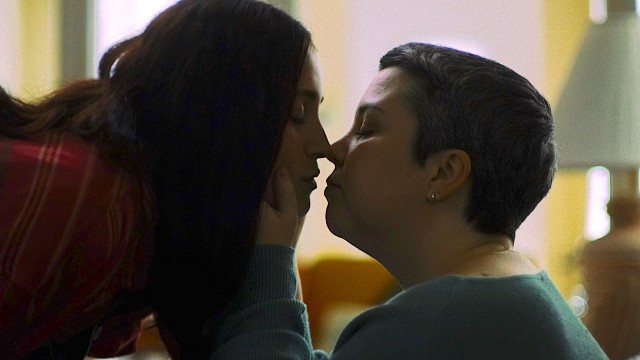We skip the preamble in Crush, as the very first image of the film is our lead, Roz (Tenea Intriago), hurriedly sliding under a bed. A bass-heavy drone elevates the tension, and right as she gets herself into place—slam—the drone cuts out, a background door shuts, and a voice rings out. With maximum efficiency, director Christian Schultz has set the scene and the priorities of his latest short. A story of unhealthy obsession verging on self-destruction, this film about a lovelorn stalker explores how to wring maximum tension from minimal means, using a confined visual space to its advantage by relying on sound design to provide the cues that move the plot forward.
The first act of the film is a classic “rubber-band” suspense sequence as Lizzy and Teddy arrive at their home oblivious to Roz under the bed. The camera attaches itself firmly to the intruder’s perspective as we witness feet and ankles move about the rooms. Expository dialogue between the couple sets the context as Teddy discusses Roz’ unhealthy fixation with Lizzy. The audience’s concern for Roz and her potential discovery morphs into something even more uncomfortable soon after.
In my mind it is a boring vector of criticism, but, living in these moralistic times, it is fair to question how much sympathy Schultz and Intriago (who co-wrote the script) expect audiences to extend to Roz. Her presence in the home is, of course, a gross violation, as is her subsequent behavior. The film’s gender flip (some studies show that 4 out of 5 stalkers are male) is likely the only thing that makes sympathy a question, which is interesting to consider. That said, cinema has a rich history of normalizing deeply inappropriate romantic behavior, and a second act that sees Roz imagining a fantasy life with Lizzy is heartbreakingly sincere. Experiencing a “crush”, enduring unrequited love, these are near-universal sensations. At what point does Roz stray too far along the spectrum of obsession for us to no longer identify?
For Schultz, it is this maladjustment that is the source of fascination. Writing to us he notes, “There are a few through-lines that I find in all of my work. I’ve recently only discovered these when talking to a friend. But I believe one of these through-lines is about obsessions. I’m fascinated with people who can’t stop themselves. Stop themselves from what they love, what they hate, or the thing that brings them success.”
Questions of whether we “like” a protagonist are some of the lowest forms of media analysis. Better to ask if they are “interesting” and, like Schultz, Roz’s compulsions satisfy that criterion for me. I am reminded of another short in our catalog, Incel—it is one thing to like a morally gray character because they are bad-ass. This has been common in our recent “golden age of television”, populated by compelling anti-heroes. It is a different, and altogether rare thing for an audience to connect with a character because they are pathetic. Intriago’s raw portrayal powerfully elicits this, but to what extent a filmmaker forces this bond, and whether investigating the pathology of such characters normalizes or even validates deeply problematic behaviors is one of the trickier questions in storytelling today.
Schultz and Intriago envision plenty of space to explore these questions as they work to turn Crush into a feature-length film in 2023.

 Jason Sondhi
Jason Sondhi
